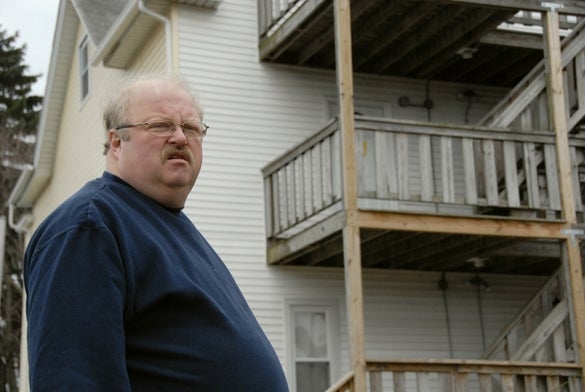Michael O’Rourke, a Worcester real estate developer, recently found himself looking at a building that he was considering working on.
“There’s all kind of rat feces and rubbish around, and [a tenant] said she had icicles in her living room over the winter,” he said.
It might not sound like the kind of property most people would want to take responsibility for, but O’Rourke, who runs Worcester County Management Corp. and O’Rourke Construction Services Inc., wasn’t considering buying it. He’s looking to become a receiver for the building as part of a Worcester City program that could be a model for communities all over the state.
After Foreclosure
Receivership itself is not a new concept. For years housing courts, including Worcester’s, have assigned receivers to take care of blighted buildings whose owners went missing or were unwilling to address code violations. Receivers collect rent and use the money to help make the repairs. A high-priority lien for all costs incurred is also placed on the property.
As foreclosures of multi-family homes became an increasingly serious problem in the city last year — and huge out-of-state banks proved unsuited to manage the buildings they foreclosed on — the Massachusetts Housing Partnership joined together with city and court officials to create a pilot program to streamline the receivership process.
Key to the initiative was selecting the nonprofit Worcester Community Housing Resources as an administrator responsible for helping assess properties’ needs, find receivers like O’Rourke and channel various public loan funds that can be used for property repairs. MHP set up a similar system in Springfield and is now working on one in New Bedford.
“The model of having a program administrator as far as I know isn’t happening anywhere else in the commonwealth,” said Rita Farrell, a senior adviser with MHP.
Improved Outcomes
Matthew E. Wally, executive director of Worcester Community Housing Resources, said that since the program started last spring, 20 properties totaling 77 units have entered the new process. Thirty-four of those units have gone through the receivership process, and 26 ended up being repaired by the owner. That second outcome is also considered a success for the program, Wally said, “because it’s almost the threat of receivership that forced the owner to respond.”
Ideally, Wally said, once the properties are repaired and brought up to code, they will be purchased by a responsible owner. So far, that hasn’t happened for any of the buildings in the program, but both Wally and Ferrell said the main point isn’t to get them through the system quickly.
“The beauty of the receivership is it stabilizes the property,” Farrell said. “As long as the properties are managed properly, that’s the goal.”
Many of the receivers that manage properties in Worcester are nonprofits, including WCHR itself as well as local community development corporations. But some, like O’Rourke, are business people hoping to make some money while supporting Worcester neighborhoods.
O’Rourke has already been officially designated as a receiver for one multi-family building, and he’s considering a second one. With the construction market at a low point, he said, his construction business could use the work repairing the properties. He said he can do the work himself as long as he offers proof that he paid himself at fair market rates.
“We’re slow, and it’s a good fill-in,” he said.
Besides, O’Rourke said, improving the city by cleaning up run-down buildings is in his own long-term interest.
“All my property’s in the city, so I don’t want to see the city go bad because it brings everybody’s property down,” he said.
Over the last few months, MHP and the state Attorney General’s office have received $635,000 in federal funding to continue and expand the receivership efforts. Farrell said that money will help support the three existing pilot programs and provide trainings targeted to 39 communities that are eligible for neighborhood stabilization funds. In Central Massachusetts, Fitchburg, Framingham, Leominster, Marlborough and Milford could all benefit from the trainings, which will be held in May and June.
“In many communities we’re just introducing the whole concept of receivership,” Farrell said.
She said smaller towns may not have full inspectional service departments and may not even realize the tool is available.
As part of the new collaboration, the Attorney General’s office also has assistant attorneys general available to offer technical assistance to the communities.
Meanwhile, O’Rourke says it’s too soon to tell whether his part in the Worcester program will be worth the effort, but he said he’s hopeful.
“I really think it’s going to work out,” he said. “I think it’s going to help the city too.”

